Game Plan Spread
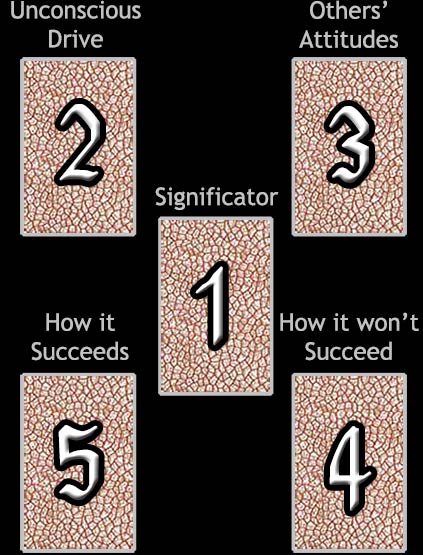
Difficulty: Easy
When a person has a certain plan in mind, this simple five-card spread presents a choice, hinting at what action or attitude should be taken for their plan to succeed, and what should be avoided to help the plan work out for the best.
The initial card is laid in the centre of the layout, the significator. The following four cards are laid out clockwise around the significator.
In this spread, the second card is about what drives the reader, but also says they are not fully conscious of this, perhaps even completely unaware of it. It provides a hint as to the reason they strive for their goal.
The third card uncovers what others think of the reader and their goals. The reader may or may not be aware of this. Sometimes other people factor into the plans (and sometimes they don't).
The fourth card suggests what not to do. If things are permitted to go down this path, the plan will collapse.
The fifth card is a hint as to how to make this plan work out favourably. The idea this card presents should be followed to make the plan successful. It is the differences between Cards #4 & #5 that should be noted, as the differences provide important clues.
Your Game Plan Reading
Unconscious Drive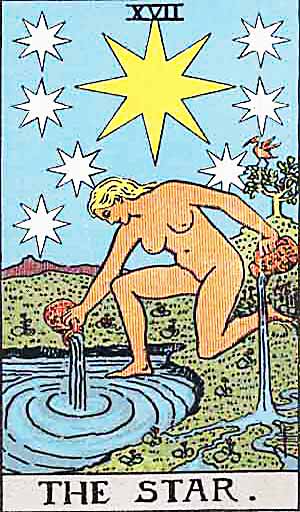 XVII – The Star, Reversed |
External Influences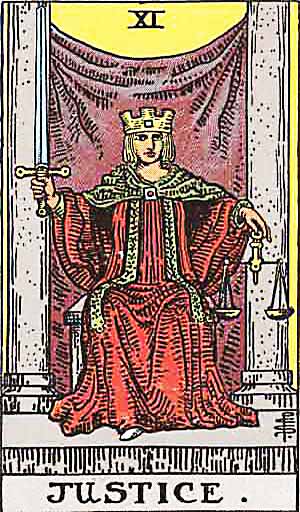 XI – Justice |
|
Significator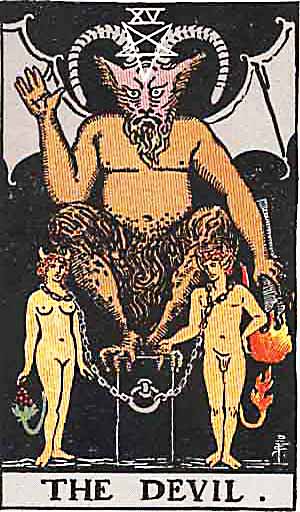 XV – The Devil, Reversed |
||
How it Will Succeed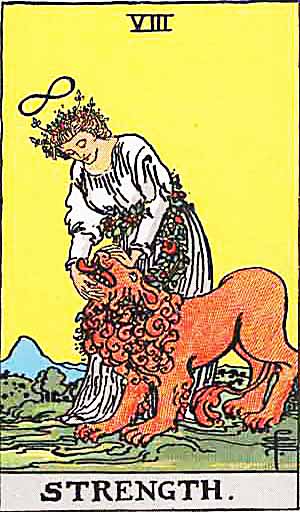 VIII – Strength |
How it Will Not Succeed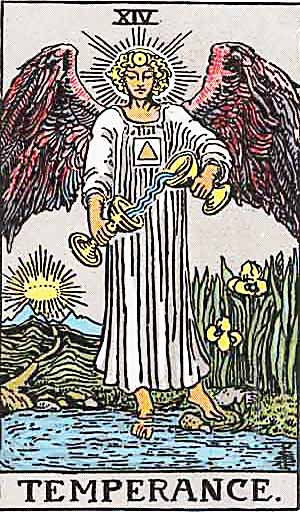 XIV – Temperance |

XV – The Devil, Reversed
The Devil represents temptation, addiction, materialism, and the shadow self. It embodies the forces that bind us to unhealthy patterns, illusions, and attachments. A powerful, frightening figure symbolises the internal and external forces that trap us in cycles of desire, fear, and self-doubt. This card is about the darker side of human nature—the impulses, obsessions, and habits that may seem alluring at the moment but ultimately prevent growth and freedom. The chains are loosely fitted on the figures, suggesting that the freedom to break free from these constraints is possible, but only when you recognise your own power and the nature of your attachments.
Reversed, the Devil can indicate a breaking free from bondage, temptation, or unhealthy attachments. It suggests you are beginning to free yourself from negative patterns, addictions, or toxic situations that have held you captive. However, the reversed Devil also cautions that the work of liberation is ongoing. While the chains are loose, it can take time to confront lingering fears or attachments before you are free. This card reversed encourages continued self-awareness, growth, and healing, reminding you that true freedom comes from within and requires conscious effort to remain free from temptation and negative influences.
In Relationships: The Devil suggests you may be entangled in a toxic or unhealthy relationship dynamic. This could include co-dependency, manipulation, or addiction to the relationship itself. The card warns against staying in situations where attachment or control are the primary forces at play. It may also point to unhealthy patterns in your behaviour, such as fear of intimacy or a reliance on superficial desires rather than deeper emotional connection. The Devil invites you to take a step back and examine your motivations in relationships, encouraging you to break free from unhealthy attachments and embrace healthier, more empowering connections.
In Work: The Devil may indicate that you are trapped in a cycle of materialism, greed, or unhealthy work habits. It could suggest an over-reliance on success or external validation, or feeling bound to a job, career, or ambition that no longer serves your highest good. This card can also point to unhealthy competition, control issues, or toxic environments in the workplace. The Devil encourages you to assess where you are compromising yourself in pursuit of career success or material gain. It suggests that fulfilment comes from aligning with your authentic purpose and breaking free from self-imposed limitations.
Spiritually: The Devil speaks to the shadows within the self—the unresolved fears, ego attachments, and limiting beliefs that keep you from experiencing freedom and enlightenment. This card invites you to confront your inner darkness and the forces that bind you to the lower aspects of your nature. The Devil challenges you to examine your relationship with fear and temptation and recognise how these forces may be blocking your spiritual growth. This card calls for liberation, urging you to break free from whatever is holding you back from experiencing spiritual truth.

XVII – The Star, Reversed
The Star represents hope, inspiration, healing, and spiritual guidance. This card embodies the light that shines through darkness, offering peace and renewal after turmoil. A serene figure pouring water into a pool and onto the earth represents the flow of divine energy that nurtures both the soul and the world around us. This card suggests a time of spiritual clarity, where you are guided towards inner peace, hope, and faith in the future. The bright stars above symbolise the presence of higher wisdom, while the figure's calm demeanour indicates a connection to the self and the universe.
Reversed, the Star can indicate feelings of hopelessness, disillusionment, or a lack of faith. It may suggest you are disconnected from your inner light, struggling to find hope or inspiration after a period of hardship. The reversed Star may also point to a lack of healing or difficulty moving on from old wounds. This card encourages you to reconnect with your inner sense of purpose and trust in the process of life. The reversed Star suggests you may need to nurture your spiritual well-being, work on self-healing, and open yourself to the possibility of renewal and hope, even when it seems difficult.
In Relationships: The Star signifies healing and renewal or the hope of a new and positive beginning. It suggests that you or your relationship may be in a phase of recovery, where old wounds are being healed, and the relationship is growing into something more harmonious. The Star encourages optimism, suggesting that you trust in the potential for future growth and love. It may also indicate a time for healing after a breakup or a difficult emotional period, reminding you that new love, hope, and happiness are on the horizon. This card promotes spiritual alignment and connection in relationships, guiding you to love yourself first before sharing that love with another.
In Work: The Star signifies renewal, hope, and inspiration in your professional life. It suggests new opportunities are emerging or you are reconnecting with your true purpose or passion in your work. This card encourages creativity, innovation, and the pursuit of dreams, indicating that you are on the right path towards fulfilling your professional goals. The Star brings clarity and guidance, suggesting to trust your intuition and vision for the future. It can also represent a time of recovery or rebuilding after setbacks or challenges, reassuring you that you have the potential to succeed if you stay true to your values.
Spiritually: The Star represents divine guidance, healing, and connection to the higher self. This card invites you to open your heart to spiritual insight and trust that you are being guided by the universe. The Star suggests a period of spiritual renewal, where you may experience peace, clarity, and alignment with your spiritual path. It encourages you to have faith in your spiritual journey, even if the road ahead seems unclear. The Star is a reminder that the universe is always guiding and supporting you, and that spiritual growth comes with a sense of trust, hope, and connection to the divine.

XI – Justice
Justice represents fairness, truth, accountability, and the law of cause and effect. It embodies the principle of balance, emphasising the need for integrity, fairness, and impartiality. A figure holding a sword in one hand and scales in the other serves as a reminder that actions have consequences, and that truth will always prevail. The sword symbolises clarity, reason, and decision-making, while the scales represent equilibrium, weighing all sides of a situation before making a judgement. This card reminds us that justice is not just about external laws, but about personal responsibility and moral alignment with the truth.
The Justice card indicates you may be faced with a decision that requires fairness, objectivity, and a commitment to what is right. It encourages you to consider all the facts, assess situations without bias, and make decisions based on truth and integrity. Justice also speaks to the consequences of your actions, emphasising that what is sown will be reaped, and suggesting that fairness and ethical behaviour will bring about positive outcomes, while dishonesty or imbalance may lead to negative consequences.
In Relationships: Justice speaks to the need for honesty, fairness, and mutual respect. It may indicate a time for evaluating the dynamics of a relationship, ensuring that both partners treat each other with integrity and fairness. This card encourages you to approach romantic situations with clear communication and seek balance, where both partners' needs are considered and respected. If you are dealing with relationship issues, Justice may suggest the need to take responsibility for your actions or make amends. It can also indicate that the truth will determine the outcome of a romantic situation.
In Work: Justice signals a need for fairness in professional matters, including decision-making, disputes, and negotiations. It encourages you to act with integrity in the workplace, ensuring your actions align with ethical standards and legal requirements. This card may also suggest that you are facing a situation where justice will play a role, such as a legal matter or a need to resolve an issue that requires an impartial viewpoint. Justice reminds you that success will come from fair actions and by making decisions in alignment with your values. It also suggests karmic debts in the professional sphere may be settled, either through rewards for integrity or consequences for dishonesty.
Spiritually: Justice represents the principle of cosmic law, the balance between light and dark, and the understanding that everything is connected through universal laws. This card encourages you to reflect on your actions and beliefs, ensuring they are in alignment with higher truth. Justice invites the seeker to embrace personal accountability, recognising that spiritual growth comes from living a life balanced and true to one's values. It is a reminder that truth and fairness are universal principles that guide the spiritual path and that every action has a karmic effect. In the spiritual realm, Justice asks you to seek equilibrium, balance, and the deeper truth that lies beneath surface appearances.

XIV – Temperance
Temperance represents balance, harmony, moderation, and healing. This card embodies the principle of integrating opposites and finding equilibrium within oneself and in the world. An angel or ethereal figure pours water from one cup to another, the imagery of Temperance suggests the blending of two elements to create something harmonious. The flowing water symbolises the steady flow of energy, while the angel's wings and serene expression point to a divine guidance in achieving harmony. This card teaches the importance of moderation, patience, and self-control in all areas of life.
Temperance encourages you to find a middle ground, avoid extremes, and seek moderation in your choices and actions. It invites balance not only in the material world but also in the emotional and spiritual realms. This card speaks to the need to blend various aspects of life—whether work and play, self-care and socialising, or mind and body—into a cohesive whole that nurtures well-being and inner peace. It suggests that patience and a calm, measured approach will lead to the best results.
In Relationships: Temperance suggests that balance and harmony are key in your relationship. It may indicate the need for moderation in how emotions, time, and energy are shared between partners. This card encourages you to avoid extremes—whether in expectations, communication, or attachment—and instead find a balanced approach that fosters mutual respect, understanding, and patience. Temperance speaks to a steady connection, where both partners support each other's growth while maintaining their individuality. It can also indicate healing in relationships, whether overcoming challenges or finding a new sense of balance and understanding between two people.
In Work: Temperance signifies a time for finding balance in one's professional life. This card encourages you to manage your workload, relationships, and responsibilities with grace and moderation, avoiding burnout and stress. It may suggest the need for collaboration or the blending of unique skills or talents to achieve success. Temperance reminds you that steady, thoughtful progress, rather than hasty or extreme actions, is the key to long-term success. This card can also point to a need for healing in the workplace, whether it's resolving conflicts or restoring calm to a stressful environment.
Spiritually: Temperance represents the pursuit of inner balance and integration. This card invites you to align your physical, emotional, and spiritual selves into a harmonious whole, finding peace through moderation, patience, and acceptance. It encourages you to seek spiritual growth through balance rather than extreme practices or rigid beliefs. Temperance suggests that spiritual enlightenment can be achieved when the seeker is in harmony with both the inner self and the external world. It is a reminder that the path to spiritual fulfilment is about maintaining balance and being open to divine guidance.

VIII – Strength
Strength represents courage, resilience, patience, and control. It embodies the power of taming inner fears, overcoming adversity with gentleness, and having the fortitude to face challenges with grace. A woman calmly holding the jaws of a lion signifies the balance between power and compassion, where strength comes not from force, but from a sense of inner calm and self-confidence. The woman's serene expression conveys that this strength is not aggressive, but is instead the ability to remain composed in the face of difficulty, harnessing personal power through self-discipline and understanding.
This card represents the courage to face life's challenges, persevere with patience, and trust in the process of growth. Strength reminds us that resilience is built from within, and that sometimes the greatest strength lies in showing vulnerability and compassion rather than exerting dominance. It is an invitation to approach difficult situations with kindness, both towards oneself and others, and trust that inner strength will carry you through.
In Relationships: Strength speaks to the power of patience, understanding, and unconditional love. It suggests you may be called upon to show compassion and support, particularly in times of difficulty or uncertainty. This card signifies the need for gentle, yet firm, emotional strength in navigating challenges, and reminds you that love is based on mutual respect, trust, and the ability to remain calm and supportive through all circumstances. It encourages you to act from a place of empathy, understanding that love is about partnership and compassion.
In Work: Strength represents the inner resilience needed to overcome obstacles and persevere in the face of professional challenges. It suggests your path to success will require patience, determination, and a steady hand in difficult situations. This card advises you to rely on your inner strength, confidence, and emotional intelligence to navigate challenges in the workplace, whether dealing with difficult colleagues, demanding tasks, or career setbacks. Strength encourages you to move forward with grace and conviction, trusting that inner resilience will lead you to success.
Spiritually: Strength signifies the mastery of the self, the ability to conquer one's inner demons, and the courage to follow one's spiritual path. This card calls you to dig deep within yourself for the fortitude to face your fears, heal emotional wounds, and cultivate peace. Strength emphasises that true power comes from compassion, inner harmony, and the ability to work through difficulties with faith and patience. It invites you to trust your spiritual journey and allow understanding to guide your growth.